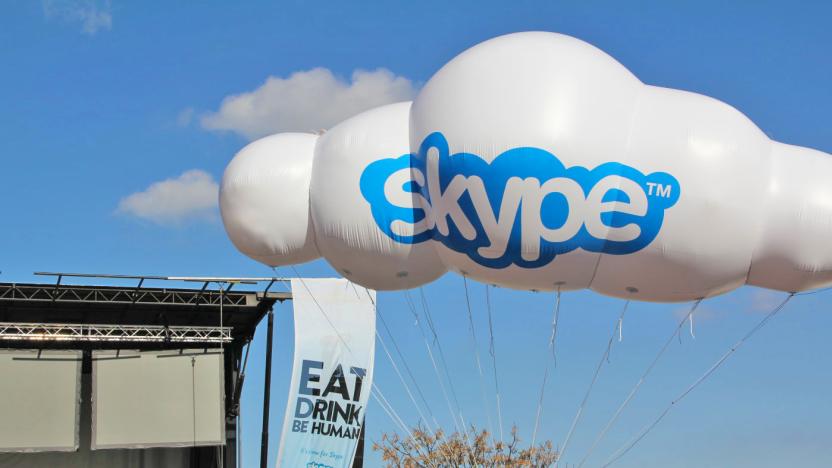ddos
Latest

Google's Project Shield helps any news site beat DDoS attacks
The distributed denial-of-service attack, better know as a DDoS, is one of the more basic but effective ways of shutting down a website you might want to torment. Often, hackers use them to silence sites who hold viewpoints they disagree with, making it a popular tool for internet censorship. A few years ago, Google launched Project Shield, a tool that would let small sites route their traffic through Google in an effort to avoid such attacks -- and today, Wired is reporting that virtually any news site can sign up to be part of Project Shield and use Google's technology to stay online in the face of a DDoS attack.
Nathan Ingraham02.24.2016
Skype hides IP addresses to protect users from online trolls
Let's be honest: it's pretty hard to find someone who will be genuinely happy for you when you win something. When it comes to online gaming, however, that probability falls to zero. Losing a multiplayer game leaves some people so angry that they'll go out of their way to force fellow players offline. In order to do this, gamers can use tools to locate a target's IP address from just their target's Skype username and then launch a DDoS attack to overload their internet connection. It's not the most common attack vector but Microsoft has changed the way its messaging app works so that gamers, and the wider Skype community, can rest a little easier knowing it's harder for them to be tracked.
Matt Brian01.22.2016
Anonymous takes credit for cyberattacks crippling Turkey
Apparently, the hacktivists from Anonymous aren't just targeting ISIS directly -- they're causing chaos for indirectly responsible countries, too. The collective is taking credit for an escalating series of cyberattacks that have disrupted banks, internet backbones and government websites in Turkey. The campaign is meant to punish Turkey for allegedly turning a blind eye to activities that fund ISIS' extremism, such as oil smuggling. According to Radware, the attacks have been so fierce that they took down access to 400,000 sites and left Turkey blocking traffic in an attempt to keep sites online.
Jon Fingas12.27.2015
Malware turns hundreds of security cameras into a botnet
Closed-circuit security cameras are supposed to make you safer, but some malware is turning them into weapons. Researchers at Incapsula have discovered code that turned about 900 Linux-based CCTV cameras into a botnet, which promptly bombarded an unnamed "large cloud service" that serves millions of people. The intruders compromised cameras from multiple brands, all of which had lax out-of-the-box security -- in some cases, they'd been hacked by more than one person.
Jon Fingas10.25.2015
Security firm discovers Linux botnet that hits with 150 Gbps DDoS attacks
Akamai announced on Tuesday that its Security Intelligence Response Team has discovered a massive Linux-based botnet that's reportedly capable of downing websites under a torrent of DDoS traffic exceeding 150 Gbps. The botnet spreads via a Trojan variant dubbed XOR DDoS. This malware infects Linux systems via embedded devices like network routers then brute forces SSH access. Once the malware has Secure Shell credentials, it secretly downloads and installs the necessary botnet software, then connects the newly-infected computer to the rest of the hive.
Andrew Tarantola09.29.2015
Lizard Squad takes revenge on UK police with DDoS attack
Lizard Squad has claimed responsibility for a temporary takedown of the UK's National Crime Agency (NCA) website, almost certainly in response to a series of arrests targeting customers of the hacker collective's DDoS-for-hire service. Last week, the agency announced that UK police had apprehended six British teenagers for using Lizard Stresser, a tool developed by Lizard Squad which allows anyone to cripple websites with Distributed Denial of Service (DDoS) attacks. All of the suspects were released on bail and the NCA said it would be visiting 50 addresses to issue warnings to registered users.
Nick Summers09.01.2015
UK police arrest teens for using Lizard Squad's paid DDoS service
Six British teenagers have been arrested for using Lizard Stresser, a Distributed Denial of Service (DDoS) tool developed by the troublesome hacker collective Lizard Squad. According to the National Crime Agency (NCA), these individuals, who have now been released on bail, targeted a national newspaper, a school, gaming companies and various online retailers. They paid in "alternative" currencies such as Bitcoin in order to stay anonymous, however those measures have proven futile. Lizard Squad rose to prominence last year when it took down the PlayStation Network and Xbox Live. The group quickly claimed responsibility and, as if it were marketing stunt, launched Lizard Stresser -- a takedown-for-hire service that allowed anyone to cripple unsuspecting sites.
Nick Summers08.28.2015
Cyberattack takes down Canadian government websites
It's not just the American government that's facing withering internet attacks in recent days. Canadian officials have confirmed that a "cyberattack," likely a denial of service campaign, has taken down government websites on the gc.ca web domain -- which, if you know the country, means that virtually every federal institution is inaccessible online. Many government email accounts are largely out of commission as well. It's not clear whether the assault has compromised any sensitive data, but traffic floods like this are typically focused more on knocking sites out of commission than swiping info.
Jon Fingas06.17.2015
Teen arrested for breaking an entire school district's internet
A teenager from Idaho has landed themselves in hot water after arranging a takedown of their school district's internet access. KTVB News reports that the 17-year-old student paid a third party to conduct a distributed denial of service attack that forced the entire West Ada school district offline. The act disrupted more than 50 schools, bringing everything from payroll to standardized tests grinding to a halt. Unfortunate students undertaking the Idaho Standard Achievement test were required to go through the process multiple times because the system kept losing their work and results.
Daniel Cooper05.20.2015
Two Asian bank websites held ransom for bitcoin
One of the problems with virtual currency is that when it's robbed from a bank, it's going to take an awful lot of work to make it look exciting in a movie. So I feel for future filmmakers who have to dramatize something like the recent Chinese cyber heists where the culprits demanded bitcoins from the Bank of China and Bank of East Asia in exchange for not launching attacks on their websites. Regional publication The Standard reports that the each of the financial institutions' websites were hacked last Saturday, with emails sent stating that to avoid another distributed denial of service attack, bitcoin payments would be necessary. Authorities say that the intrusions came from multiple countries and that no bank or customer data had been affected. Eat your heart out, Michael Mann. Oh, wait.
Timothy J. Seppala05.16.2015
China's 'Great Cannon' shoots down websites it doesn't like
According to a new report from Citizen Lab, China has not only built itself a "Great Cannon" but has already fired it as well. This potent online weapon seems to be capable of intercepting internet traffic at the national level then directing it at specific networks to knock them offline. China's already widely suspected of being behind the recent attack against Github, which was overloaded for nearly a week via "an ongoing and evolving large DDOS attack." Now it appears that Github's attackers used the Cannon to redirect that traffic from Chinese search engine giant Baidu to cripple the website. All reportedly because the San Francisco-based website hosted a pair of pages that link to content banned in China.
Andrew Tarantola04.10.2015
UK police arrest 57 people as part of 'cyber crime strike week'
What's the most effective way to discourage cyber crime across Britain? There's no definitive answer, but the latest tactic seems to be co-ordinating and publicising a concentrated blast of arrests. The UK's National Crime Agency (NCA) revealed today that 57 people have been taken into custody for suspected cyber crime offences this week, including distributed denial of service (DDoS) attacks, network breaches and data theft. The arrests were split into 25 separate operations across England, Scotland and Wales, involving local forces and officers from the NCA's National Cyber Crime Unit.
Nick Summers03.06.2015
Here's the code you need for Sony's 10 percent PSN store discount
Sony took a bit of flack over the Christmas break when its PlayStation Network was hit by a devastating denial-of-service attack. It took a few days for the gaming service to recover from Lizard Squad's assault and, to make up for the festive downtime, Sony is now rewarding its players with a five-day PSN extension and a one-time 10 percent PSN store discount. Today, we've finally got the all-important UK code: T6R3KB529K. It's valid until 9am on January 26th and can be applied to the total value of your PS3 or PS4 basket. There are a few exceptions, however. Sony says the code won't work for video rentals, game pre-orders, PS Plus and Music Unlimited subscriptions -- that's quite a list, but at least you can buy some digital games to tide you over until Evolve's release next month. Oh, and if you live outside of the UK, head to the source below for all of Sony's other codes.
Nick Summers01.23.2015
UK teen arrested over suspected involvement in Xbox Live, PSN DDoS attacks
An 18-year-old male was arrested as part of a larger investigation into the attacks which brought down the PlayStation Network and Xbox Live in 2014, according to a statement released earlier this week by the UK's South East Regional Organised Crime Unit (SEROCU). Craig Jones, head of SEROCU's Cyber Crime Unit, attested to working with the FBI on the investigation, which also includes numerous "swatting" offenses. "This investigation is a good example of joint law enforcement cooperation in relation to a type of criminality that is not restricted by any geographical boundaries," Jones said. "We will continue to work closely with the FBI to identify those to who commit offences and hold them to account." The alleged cyber criminal was brought in under suspicion of unauthorized access to computer material contrary to section 1 of Computer Misuse Act 1990, unauthorized access with intent to commit further offences contrary to section 2 of Computer Misuse Act 1990 and threats to kill contrary to Section 16 of Offences against the person Act 1861. [Image: Microsoft/Sony]
S. Prell01.17.2015
UK police arrest man connected to Lizard Squad PlayStation and Xbox attacks
Ever since its Christmas Day attack that took PlayStation and Xbox Live servers down, the "Lizard Squad" has taunted authorities while simultaneously trying to market its takedown-for-hire DDoS service. Police apparently arrested a London-based man affiliated with the group before the turn of the year (although it was over claims of PayPal hacking), but UK authorities have today claimed that they've tracked down at least one member who was involved in the attacks. Officers from the South East Regional Organised Crime Unit (SEROCU) Cyber Crime Unit say that they have arrested an 18-year-old man in connection with a "the denial of service attack of Sony Playstation and Xbox systems in 2014 and swatting offences."
Matt Brian01.16.2015
Lizard Squad hacker arrested for cyber-fraud
A form of justice may have come to bear on one of the members of Lizard Squad. Today, police in Britain have arrested 22-year-old Vinnie Omari, who has connections to the hacker group, for alleged cyber-fraud. The arrest is unrelated to some of the recent activities of Lizard Squad, which includes shutting down the PlayStation Network and Xbox Live over Christmas, DDoS attacks on Destiny this past September, and a bomb threat made on a plane carrying SOE President John Smedley last August. Omari was sought in connection to PayPal thefts from 2013 to 2014.
Justin Olivetti01.05.2015
Sony to compensate PSN users with Plus extension, discount code
Sony's offering five days of extra PlayStation Plus membership as its way of making up for the recent network outage. The gesture of goodwill isn't limited to Plus subscribers, as all PlayStation Network users are getting a one-time 10 percent discount code for the PS Store. Sony's Eric Lempel said the company "wanted to show our appreciation" for users' patience after last month's PSN outage, which saw services like the Store and online multiplayer go AWOL. Both PSN and Microsoft's Xbox Live service went offline on Christmas Eve following distributed denial of service attacks.
Sinan Kubba01.02.2015
PlayStation Network is back online following Christmas Day attack
Three days after Lizard Squad's latest denial of service attack knocked the PlayStation Network offline (and Xbox Live, we'd add), the internet gaming service is gradually getting back on its feet. Sony now says that PSN should be up and running for all of its consoles. While the company warns that there might be some "intermittency" as it gets back into the swing of things, you theoretically won't face major interruptions during that big Destiny raid. It's not clear if Sony's infrastructure will be any better at weathering future digital assaults on this scale; given that the attack was supposedly three times larger than the previous record-setter, this probably isn't a permanent fix. However, it's good to know that you can squeak in at least some online gaming on that shiny new PS4 before the holidays are over.
Jon Fingas12.28.2014
PSA: PlayStation Network back online, service restored [Update]
The PlayStation Network appears to be fully armed and operational, according to an update post on the PlayStation Blog. The update confirms that the PSN suffered a DDoS (distributed denial of service) attack on Christmas Eve Day, and though the group that took credit for bringing the service down claimed to have ceased its attack on December 25, it was not until late last evening that service was restored. Sony now reports in no uncertain terms that "PlayStation Network is back online." If you received or purchased a PlayStation system over the holidays, you should be free to enjoy your new console. Update: If you're a PS4 user still having difficulties logging in, the Ask PlayStation Twitter account suggests that age-old fix of restarting your system. A tweet reads, "PS4 users: If you are still having issues signing in to PSN today, please reboot the console and try again." [Image: Sony]
S. Prell12.28.2014
These are the hackers who wrecked your holiday gaming
If you're a console gamer, you're probably all too aware of Lizard Squad, the hacker outlet that allegedly knocked both the PlayStation Network and Xbox Live offline for a good chunk of the Christmas break. But just why and how is this group causing so much grief? Thanks to the Daily Dot, we now have a better (if imperfect) idea of what's going on. It might not shock you to hear that the team is doing this both for laughs, à la LulzSec, and to expose the "incompetence" of the security teams at Microsoft and Sony. However, they also claim to have access to undersea internet cables and other "core routing equipment" that lets them flood networks with massive amounts of data. They supposedly bombarded PSN and XBL at a rate of 1.2 terabits per second, or three times the rate of the previous largest attack on record.
Jon Fingas12.28.2014